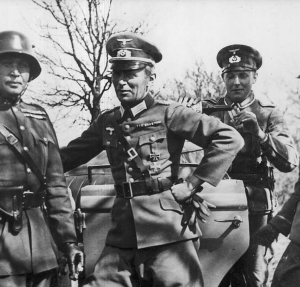Anschluss, the German term for “annexation” or “connection,” refers to the historic event in 1938 when Nazi Germany incorporated Austria into its territory. This aggressive move was a significant step towards Adolf Hitler’s ambitions of uniting all German-speaking people under one nation.

- Background and Hitler’s Ambitions:
After World War I, Austria-Hungary was dissolved, and Austria emerged as an independent republic. However, the country faced economic challenges and political instability during the interwar period. Meanwhile, Adolf Hitler and the Nazi regime sought to build a Greater Germany that unified all German-speaking people.
- The Anschluss:
On March 12, 1938, German troops entered Austria without significant resistance. Hitler’s government justified the annexation by claiming it was necessary to protect ethnic Germans in Austria and fulfill the idea of uniting all Germans in one nation. The Anschluss was seen as a historic moment by the Nazi regime and was celebrated by many Austrians who supported the unification.
- International Response and Treaty Violations:
The Anschluss violated the terms of the Treaty of Versailles, which forbade the unification of Germany and Austria. The international community expressed concern, but little action was taken to prevent or oppose the annexation. This lack of action emboldened Hitler and contributed to his belief that further aggression would not be met with strong resistance.
- Impact on Austria and Nazi Germany:
The annexation resulted in Austria becoming part of Nazi Germany and being renamed “Ostmark.” Austrian political institutions were dismantled, and the country was integrated into the German Reich. The Anschluss further strengthened Nazi Germany’s military and economic position, preparing it for more aggressive actions on the world stage.
- Perceived Benefits and Challenges:
For some Austrians, the Anschluss was perceived as a moment of national unity and a return to a greater German identity. However, others felt a loss of independence and feared the consequences of aligning with Nazi Germany. Any potential opposition was swiftly suppressed by the German military.
- Anschluss and the Prelude to World War II:
The Anschluss was a pivotal event that increased tensions in Europe and set the stage for further aggression. The lack of effective opposition from the international community encouraged Hitler to pursue further territorial expansion, leading to the eventual outbreak of World War II.
- Post-World War II Impact:
After World War II, the legitimacy of the Anschluss was questioned, and Austria worked to reestablish itself as an independent nation. The annexation remained a controversial topic in Austrian history and international relations for decades to come.:
Anschluss, the annexation of Austria by Nazi Germany in 1938, was a significant event that shaped history. It was a crucial step towards Adolf Hitler’s ambitions of uniting all German-speaking people under one nation. The international response to the Anschluss, or lack thereof, emboldened Hitler and contributed to his belief that further aggression would not be met with strong resistance. This annexation foreshadowed the horrors of World War II and remains a pivotal moment in the course of 20th-century history. The legacy of the Anschluss serves as a reminder of the dangers of unchecked aggression and the importance of international cooperation in maintaining peace and stability.
Cite This Article
"Anschluss: The Annexation That Shaped History" History on the Net© 2000-2024, Salem Media.
April 28, 2024 <https://www.historyonthenet.com/anschluss-the-annexation-that-shaped-history>
More Citation Information.





